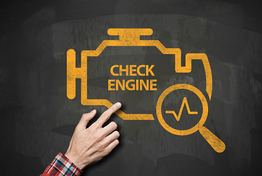You’re driving along – minding your own business on the road, and your check engine light goes on. If you’re like most Minnesotan drivers, you may wonder why your check engine light is on all of sudden and what it really means. Your check engine light is a warning from your car’s engine that something is awry, and we always recommend having your mechanic check it out. But if you’ve wondering why it may be on, we’ve got you covered with some common reasons the check engine light goes on.
Loose or faulty gas cap
Your gas cap and valves keep your gas in your tank and circulate the gas. If your gas cap is loose, it may cause you to lose fuel due to evaporation or for your fuel to circulate improperly.
Worn spark plugs
Your spark plugs ignite a mixture of fuel and air to create combustion which powers your engine’s cylinders. If your spark plugs are not firing right, it can cause an engine misfire which increases hydrocarbon emissions and can create weaker engine performance.
Faulty catalytic converter
Your catalytic converter changes carbon monoxide into carbon dioxide which helps protect the environment. When your catalytic converter is faulty, it can reduce your fuel economy and increase your exhaust emissions. The answer is not always a replacement. Typically, this can be caused by something else like a blown head gasket which can force burnt coolant vapor into your exhaust.
Dirty MAS airflow sensor
Your MAS airflow sensor determines how much fuel is needed to run the engine. It measures the amount of air entering the engine, and can be susceptible to oil and dirt build up. Your MAS airflow sensor may need cleaning, but ask your mechanic to inspect it to be sure.
Oxygen sensor failure
Your oxygen sensor measures the amount of unburnt oxygen in your exhaust system. It sends data to your car’s computer which uses this information to regulate the mixture of air and fuel that enters the cylinders. If you have a sensor failure, your car can keep running, but it will burn more fuel – and over time can damage your spark plugs and catalytic converter.
Vacuum Leak
Your vacuum system helps decrease emissions by routing the fumes as gas evaporates through the engine. Your vacuum hoses can crack or dry out especially if exposed to intense heat or cold.
Issues with your ignition coils
Your ignition coils deliver electrical pulses to each spark plug. When your engine computer sends a signal, the coil releases pent up energy to the spark plug when it ignites a mixture of air and fuel. Ignition coils are prone to failure after several years which can lead to poor fuel economy, and decreased engine power.
Your Fuel Injector
Each of your engine’s cylinders has a fuel injector which is a small electronically activated valve that regulates how much fuel is sprayed into the cylinder during the intake cycle. Fuel naturally has imperfections, and when these imperfections are mixed with carbon from the combustion process – it can cause the miniscule holes in the injector tip to plug or clog. When your fuel injector is completely clogged, your fuel injector can get stuck open and continuously leak fuel into the cylinder which causes your engine to run roughly.
These are just some of the issues that may cause your check engine light to turn on. It’s always a good idea to make an appointment with your mechanic when your check engine light goes on so they can correctly diagnose your engine’s problem. If your check engine light has recently turned on, our team would love to help inspect your car and get you back out on the road sooner rather than later.





Recent Comments